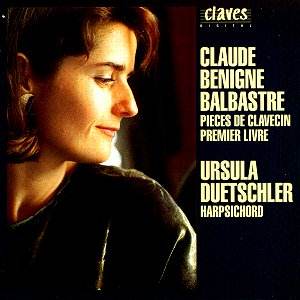|
French Baroque harpsichord music is one of those artistic
areas that would help the world to be a better place if everybody had
an appreciation for it. That the reign of the Sun King should have produced
such a quantity and consistent quality of musical activity is hardly surprising
given the enlightened environment and associated available wealth which
permeated the French court throughout the 18th century. That it is still
not appreciated as much as other keyboard music is a shame. The works
of Couperin and Rameau are reasonably well known to the general public
of listeners, but they were the only two composers of French keyboard
music whom posterity has chosen to elevate. The harpsichord was the instrument
par excellence in France throughout the 18th century and there
was hardly a composer in the kingdom who did not turn his skill to keyboard
writing. Many composers specialised in it to a greater or lesser degree,
and amongst this band of performer/composers Claude Bénigne Balbastre
certainly deserves greater recognition in our times. His music exploits
all the features of the great French harpsichords, combining a purity
of sound quality from a single melodic line with the tremendously exciting
possibilities of thrumming bass strings in a ‘musette’ and the sheer volume
obtainable from both manuals coupled in an exciting Fiè
rement et marqué.
This disc, recorded in 1992, shows us a young Ursula
Duetschler. She is now an established virtuoso, possibly better known
for her fortepiano work, but it was as a harpsichordist that she first
came to wider attention by winning the International Harpsichord Competition
in Paris in 1989. In this recording she is playing one of the finest and
most individual harpsichords to survive from the period; attributed to
Blanchet, restored by Couchet and rebuilt by the great Pascal Taskin in
1778. The character of this harpsichord, and the tremendous vibrancy and
depth in the quality of its sound are well captured here. It is the dramatic
and powerful moments that achieve the most impressive effects, from both
instrument and player [Sample 1] although this is not to minimise the
impact of beauty that Duetschler creates in the more gentle pieces. These
also benefit greatly from the seemingly silk-covered fleshiness of the
sound of this fine harpsichord. [Sample 2] Duetschler never allows an
edge of harshness, even in the most vigorous passages. Her articulation,
so important to phrase, dialogue and timbre at the harpsichord is always
carefully judged and flawlessly executed.
The Harpsichord is tuned throughout this programme in
Kirnberger III. Equal temperament such as is used on the modern piano
was not popular at this time and such temperaments as Kirnberger’s create
an hierarchy of keys in which some are perfectly tuned while more remote
keys are correspondingly wide of perfection. [By comparison, in equal
temperament every key is slightly out of tune by the same degree - thus
all keys are equally usable, but none is perfectly in tune.] The Kirnberger
tuning is popular in our times and gives most pieces in this programme
a pleasing warmth, but it is not good in some keys and Track 9 ‘De
la Caze’ is too far from the ‘good’ keys to be pleasant. [Sample 3]
It strikes this writer as somewhat strange that the German Kirnberger
system was used. French instruments generally were tuned to one of several
Tempéraments Ordinaire, which would generally be slightly
less harsh in the obscure keys. No explanation as to the choice is given
in the booklet.
Balbastre, like most of his contemporaries was writing
music for entertainment, whether of listeners or just the player. This
resulted in both the eschewing of large scale forms such as were popular
in the Germanic lands, and in the creation of portrait pieces depicting
passions, manners or individuals. The imaginative variety that composers
were able to bring to bear on these relatively small structures sometimes
defies belief. In a recital programme devoted to the music of a single
composer, there can be few more interesting choices than composers of
the French baroque, and Balbastre is as fecund in his variety as any of
them. Paired with playing of imagination and considerable virtuoso flair,
it makes this disc an excellent recital choice.
Peter Wells
|
CD Price: £ 14.00 Post-free Air Mail World-wide
- Download Price:
£ 9.40
Buy
CD:
Download all tracks:
FREE SOUND SAMPLES
(minimum 30 secs)
View track details:
CDTnº1 - C. BALBASTRE
La
Boullongne
CDTnº2 - C. BALBASTRE
La
Castelmore
CDTnº3 - C. BALBASTRE
La
D'Hericourt
CDTnº4 - C. BALBASTRE
La
Courteille
CDTnº5 - C. BALBASTRE
La
Bellaud
CDTnº6 - C. BALBASTRE
La
Lamarck
CDTnº7 - C. BALBASTRE
La
Berville
CDTnº8 - C. BALBASTRE
La
Ludeac
CDTnº9 - C. BALBASTRE
La
De Caze
CDTnº10 - C. BALBASTRE
La
Segur
CDTnº11 - C. BALBASTRE
La
Monmartel Ou La Brunoy
CDTnº12 - C. BALBASTRE
La
Suzanne
CDTnº13 - C. BALBASTRE
La
Genty
CDTnº14 - C. BALBASTRE
La
Malesherbe
CDTnº15 - C. BALBASTRE
La
Berryer
CDTnº16 - C. BALBASTRE
La
Laporte
CDTnº17 - C. BALBASTRE
La
Morisseau
You require QuickTime to listed to samples.
Get a free
QuickTime download here
|

